1Z0-808 Online Practice Questions and Answers
Given the code fragment: What is the result?
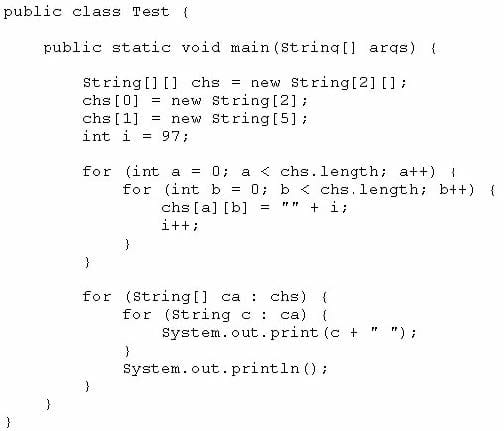
A. 1:2:3:4:5:
B. 1:2:3:
C. Compilation fails.
D. An ArrayoutofBoundsException is thrown at runtime.
Given the code fragment:
public class Test {
static String[][] arr =new String[3][];
private static void doPrint() {
//insert code here
}
public static void main(String[] args) {
String[] class1 = {"A","B","C"};
String[] class2 = {"L","M","N","O"};
String[] class3 = {"I","J"};
arr[0] = class1;
arr[1] = class2;
arr[2] = class3;
Test.doPrint();
}
}
Which code fragment, when inserted at line //insert code here, enables the code to print COJ?
A. int i = 0; for (String[] sub: arr) { int j = sub.length -1; for (String str: sub) { System.out.println(str[j]); i++; } }
B. private static void doPrint() { for (int i = 0;i < arr.length;i++) {
int j = arr[i].length-1;
System.out.print(arr[i][j]);
}
}
C. int i = 0; for (String[] sub: arr[][]) { int j = sub.length; System.out.print(arr[i][j]); i++; }
D. for (int i = 0;i < arr.length-1;i++) { int j = arr[i].length-1; System.out.print(arr[i][j]); i++; }
Which statement is true about Java byte code?
A. It can run on any platform.
B. It can run on any platform only if it was compiled for that platform.
C. It can run on any platform that has the Java Runtime Environment.
D. It can run on any platform that has a Java compiler.
E. It can run on any platform only if that platform has both the Java Runtime Environment and a Java compiler.
Given: What is the output?
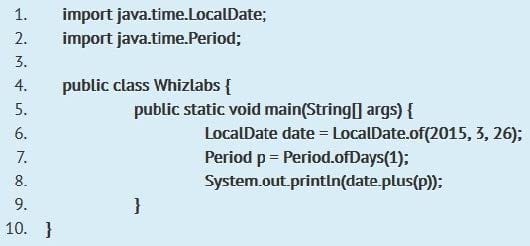
A. 2015-03-27
B. 2015-04-27
C. 2015-02-27
D. Compilation fails due to error at line 6.
E. Compilation fails due to error at line 8.
View the exhibit:
public class Student {
public String name = "";
public int age = 0;
public String major = "Undeclared";
public boolean fulltime = true;
public void display() {
System.out.println("Name: " + name + " Major: " + major); }
public boolean isFullTime() {
return fulltime;
}
}
Which line of code initializes a student instance?
A. Student student1;
B. Student student1 = Student.new();
C. Student student1 = new Student();
D. Student student1 = Student();
Given:
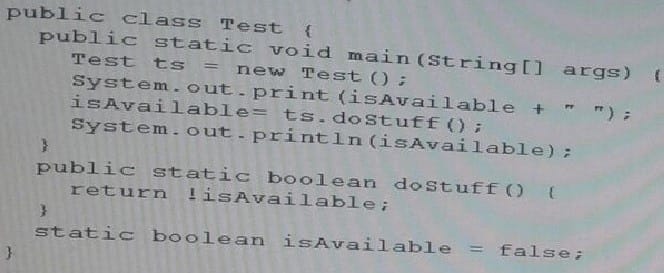
What is the result?
A. Null
B. Compilation fails
C. An exception is thrown at runtime
D. 0
Consider following method
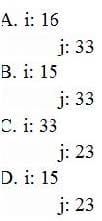
Which statement is true?
A. This method is invalid.
B. This method can be used only in an interface.
C. This method can return anything.
D. This method can be used only in an interface or an abstract class.
E. None of above.
Given:
public class TestLoop {
public static void main(String[] args) {
int array[] = {0, 1, 2, 3, 4};
int key = 3;
for (int pos = 0; pos < array.length; ++pos) {
if (array[pos] == key) {
break;
}
}
System.out.print("Found " + key + "at " + pos);
}
}
What is the result?
A. Found 3 at 2
B. Found 3 at 3
C. Compilation fails
D. An exception is thrown at runtime
Given:

And given the code fragment:
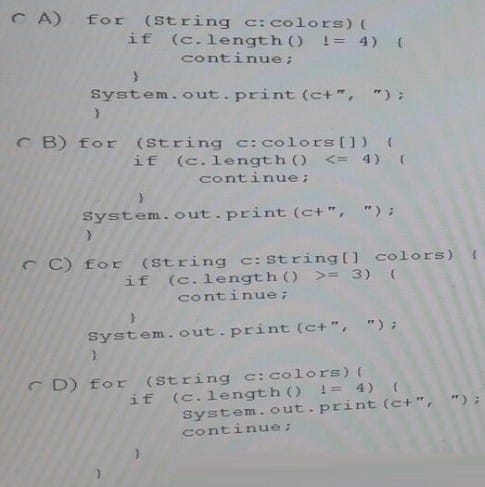
What is the result?
A. 4W 100 Auto 4W 150 Manual
B. Null 0 Auto 4W 150 Manual
C. Compilation fails only at line n1
D. Compilation fails only at line n2
E. Compilation fails at both line n1 and line n2
Given the code fragments:
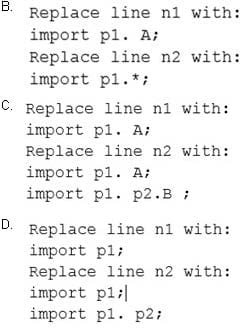
Which modification enables the code to compile?
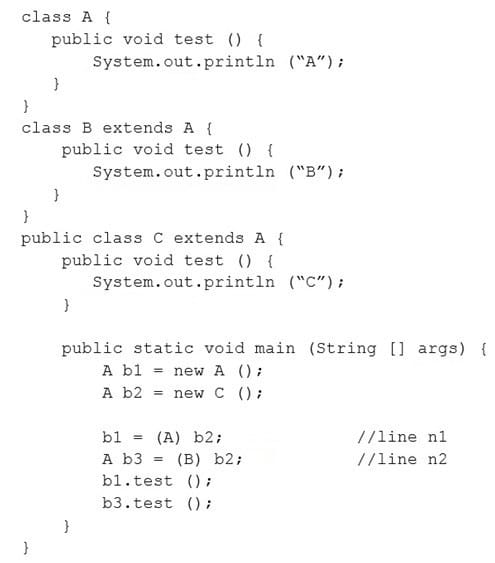
A. B.
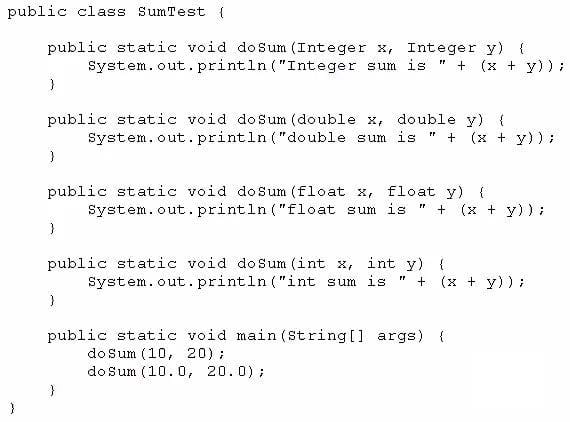
C. D.
Given the definitions of the MyString class and the Test class:
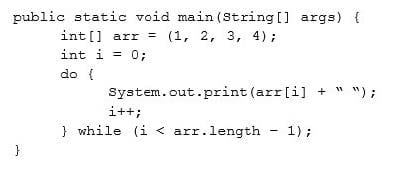
What is the result?
A. Hello Java SE 8 Hello Java SE 8
B. Hello java.lang.StringBuilder@<
C. Hello Java SE 8 Hello p1.MyString@<
D. Compilation fails at the Test Class
Given:
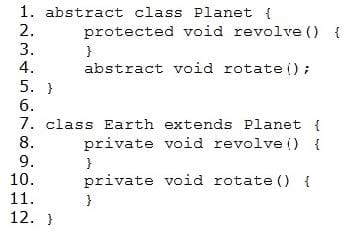
And the code fragment:
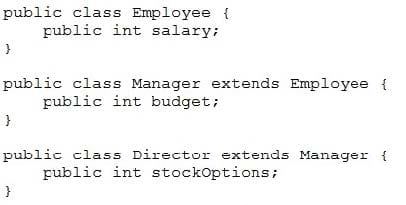
What is the result?
A. C1C2
B. C1C1
C. Compilation fails.
D. C2C2
Given the code fragment:

Test.java:
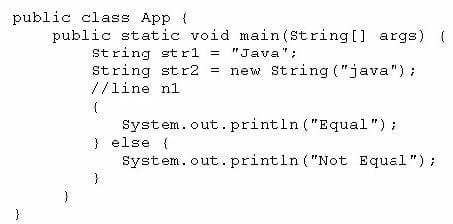
Which is the result?
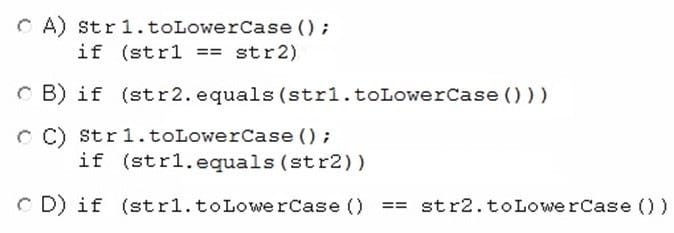
A. Option A
B. Option B
C. Option C
D. Option D
E. Option E
Given: Which action fixes the compiler error?
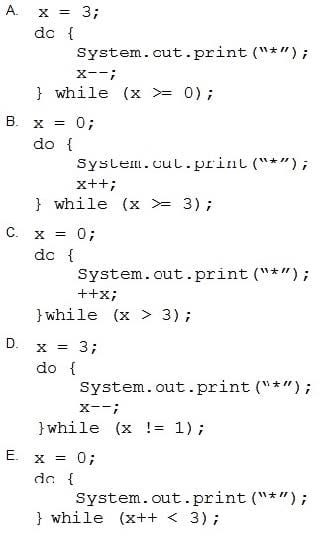
A. At line 17, add throws AccessViolationException
B. At line 13, add throws LogFileException
C. At line 2, replace throws LogFileExceptionwith throws AccessViolationException
D. At line 7, insert throw new LogFileException ();
Given these requirements:
1.
Bus and Boat are Vehicle type classes.
2.
The start() and stop() methods perform common operations across the Vehicle class type.
3.
The ride() method performs a unique operations for each type of Vehicle.
Which set of actions meets the requirements with optimized code?
A. 1. Create an abstract class Vehicle by defining start() and stop() methods, and declaring the ride() abstract method.
2. Create Bus and Boat classes by inheriting the Vehicle class and overriding the ride() method.
B. 1. Create an interface Vehicle by defining start() and stop() methods, and declaring the ride() abstract method.
2. Create Bus and Boat classes by implementing the Vehicle class.
C. 1. Create an abstract class Vehicle by declaring stop(), start(), and ride() abstract methods.
2. Create Bus and Boat classes by inheriting the Vehicle class and overriding all the methods.
D. 1. Create an interface Vehicle by defining default stop(), start(), and ride() methods.
2. Create Bus and Boat classes by implementing the Vehicle interface and overriding the ride() method.
